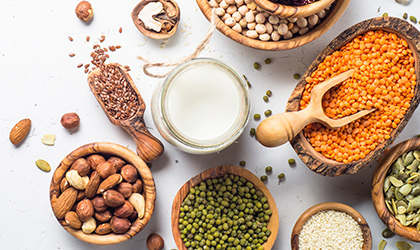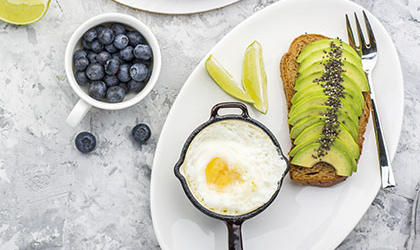
You’re probably acquainted with the well-worn cliché that calcium is brilliant bone food. But did you know protein is an essential building block of healthy bones, too? You see, protein isn’t merely confined to the likes of shake-guzzling gym buffs and bodybuilders. On the contrary, a diet rich in protein is a powerful weapon for strengthening bones. In fact, we’d goes as far to say adding protein to your bone-supporting arsenal is one of the best things you can do (watch if the rest of your body doesn’t thank you for it, too!).
Why is protein so important for bone health?
Besides making up 50% of your bone structure, protein is famous for maintaining bone mass and aiding calcium absorption. And there’s a stack of science to prove it. A growing body of research proposes older women, in particular, experience improved bone density when they consume higher quantities of proteini. Similar findings were made in a six-year observational study where 144,000 postmenopausal women were assessedii. Scientists concluded higher protein intake was associated with significantly better bone density in the hip, spine, and total body, and a decreased risk of fractures in the forearm. Learn more about how to maintain bone health after the menopause here. That’s not all. Diets that receive more calories from protein are also thought to preserve and protect bone mass during weight loss. This can be seen in one randomised, controlled trial in which women who ate 86 grams protein every day on a calorie-restricted regimen lost less bone mass from their spine, arm, hip and leg areas than their female counterparts who consumed 60 grams of protein each day iii. Convinced yet? Thought so.
Myth buster: does protein really leach calcium from bones?
However, there’s a school of thought that advocates eating too much protein isn’t good for bones, with some purporting that high protein diets can contribute to bone health conditions. Proponents of this theory believe protein spikes the acid load of your body, thereby inciting the body to leach calcium from the bones in order to neutralise itiv. And though, admittedly, there are some studies substantiating this claim, they reveal high-protein consumption only triggers short-term calcium excretion – not long termv. In actuality, longer-term studies are wholly against this idea. In a 9-week investigation, researchers found that substituting carbohydrates with animal protein didn’t affect the levels of calcium in the participants’ bodyvi. Indeed, a systematic review and meta-analysis published in 2017 established that high protein intake is not a detriment to bone health. If anything, a raft of data points to increased protein consumption supporting bonesvii.
How much protein should you eat daily?
In the UK, adults are advised to eat 0.75 grams of protein for every kilogram of body weight. So, if you weigh 65 kilograms, you’ll need 48.75 grams of protein each day. Generally speaking, men should aim for 55 grams and women 45 grams of protein daily. That translates to two palm-sized servings of fish, meat, tofu, pulses, or nuts. Where possible, try to include protein with every meal. Think porridge for breakfast, quinoa and chickpea salad for lunch, and salmon with veggies for dinner (side note: protein is incredibly satiating, so you’ll feel full for longer, too – happy bones and happy waistline!).
What type of protein should I eat?
Animal protein
Lean meat, poultry, fish, milk, yoghurt, and eggs are all rich sources of animal-based protein. But this isn’t a green card to indulge in ultra-refined meats or fast-food burgers. In particular, back off the bacon. Processed meats are crammed with preservatives and salt, which conspire to hijack your bone health and your overall wellbeing. What’s more, even if you’re a self-professed meat-lover, try to mix up your intake of animal protein with plant-based protein. Eating too much red meat, for instance, isn’t good for your heart health. Plus, cutting down on your animal protein consumption means you can do your bit for the environment (every little counts, right?).
Our vegan protein powder is free of added sugars and offers 16 grams of protein per 20 gram serving. It has a mild savoury flavour, making it an ideal supplement for soups, stews and curries. Pea protein powder can also be used in fruit and vegetable smoothies. For tasty recipes, please click here. When incorporated into dishes, our Pea Protein powder transforms into an easily digestible liquid.
Rich sources of animal protein
Roasted chicken breast: 53 grams of protein
1 can of tuna: 39 grams of protein
226 grams of cottage cheese: 27 grams of protein
85g of cooked beef: 22 gram of protein
170g of Greek yoghurt: 17 grams of protein
1 large egg: 6 grams of protein
Plant-based protein
Vegetarians, vegan, and those with lactose-intolerances, rejoice: protein isn’t just abundant in steak and dairy. Tempeh, tofu, lentils, quinoa, beans, oats, and chia seeds are also brimming with bone-supporting protein. Despite being nutritionally dense, the catch-22 is that many plant-based sources are ‘incomplete’ proteins, meaning they don’t contain the full-spectrum of amino acids needed for optimal health. If you eat an array of protein sources every day, you should, theoretically, get your dose of all the amino acids. But if you want to fast track your amino acid intake, it can be helpful to combine whole grains with legumes because they complement each other and deliver all of the essential amino acids. Black beans and rice or whole wheat bread and peanut butter are great examples. Amaranth, quinoa, chia seeds, hempseed, and soya are the exceptions to the rule, containing all the essential amino acids. Pack these into your diet and your amino acid needs will be met every day. In addition, Pea Protein Powder is a convenient way to increase protein. Simply add to smoothies, soups or curries.
Rich sources of plant-based protein
198 grams of boiled lentils: 18 grams of protein
Half a cup of raw oats: 13 grams of protein
28 grams of almonds: 6 grams of protein
185 grams of cooked quinoa: 8 grams of protein
28 grams of pumpkin seeds: 5 grams of protein
References:
-
Jennings. A., MacGregor. A., Spector. T. & Cassidy. A. (2015). Amino Acid Intakes Are Associated With Bone Mineral Density and Prevalence of Low Bone Mass in Women: Evidence From Discordant Monozygotic Twins. Journal of Bone and Mineral Research. ;31(2), 326-335.
Beasley. J., LaCroix. A., Larson. J., Huang. Y., Neuhouser. M., Tinker. L., Jackson. R., Snetselaar. L., Johnson. K., Eaton. C. & Prentice. R. (2014). Biomarker-calibrated protein intake and bone health in the Women’s Health Initiative clinical trials and observational study. The American Journal of Clinical Nutrition. ;99(4), 934-940. -
Promislow. J. (2002). Protein Consumption and Bone Mineral Density in the Elderly : The Rancho Bernardo Study. American Journal of Epidemiology. ;155(7), 636-644.
-
Sukumar. D., Ambia-Sobhan. H., Zurfluh. R., Schlussel. Y., Stahl. T.,Gordon. C. & Shapses. S. (2011). Area and volumetric bone mineral density and geometry at two levels of protein intake during caloric restriction: A randomized, controlled trial. Journal of Bone and Mineral Research. ;26(6), 1339-1348.
-
Barzel. U. & Massey. L. (1998). Excess Dietary Protein Can Adversely Affect Bone. The Journal of Nutrition. ;128(6), 1051-1053.
-
Cao. J. (2017). High Dietary Protein Intake and Protein-Related Acid Load on Bone Health. Current Osteoporosis Reports. ;15(6), 571-576.
-
Dawson-Hughes. B., Harris. S., Rasmussen. H., Song. L. & Dallal. G. (2004). Effect of Dietary Protein Supplements on Calcium Excretion in Healthy Older Men and Women. The Journal of Clinical Endocrinology & Metabolism. ;89(3), 1169-1173.
-
Shams-White. M., Chung. M., Du. M., Fu. Z., Insogna. K., Karlsen. M., LeBoff. M., Shapses. S., Sackey. J., Wallace. T. & Weaver. C. (2017). Dietary protein and bone health: a systematic review and meta-analysis from the National Osteoporosis Foundation. The American Journal of Clinical Nutrition. ajcn145110.
You Might Also Like

Olivia
Olivia Salter has always been an avid health nut. After graduating from the University of Bristol, she began working for a nutritional consultancy where she discovered her passion for all things wellness-related. There, she executed much of the company’s content marketing strategy and found her niche in health writing, publishing articles in Women’s Health, Mind Body Green, Thrive and Psychologies.
View More






